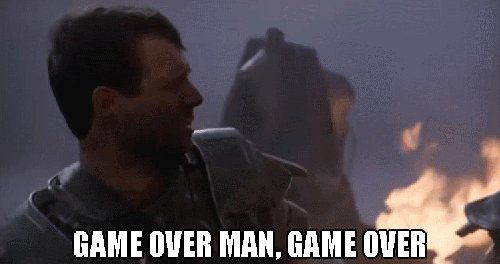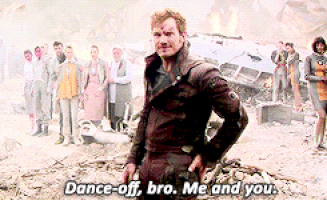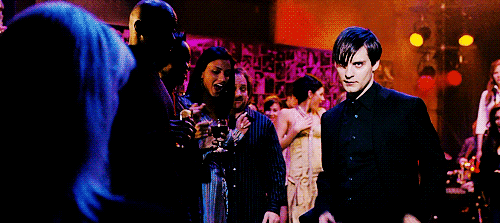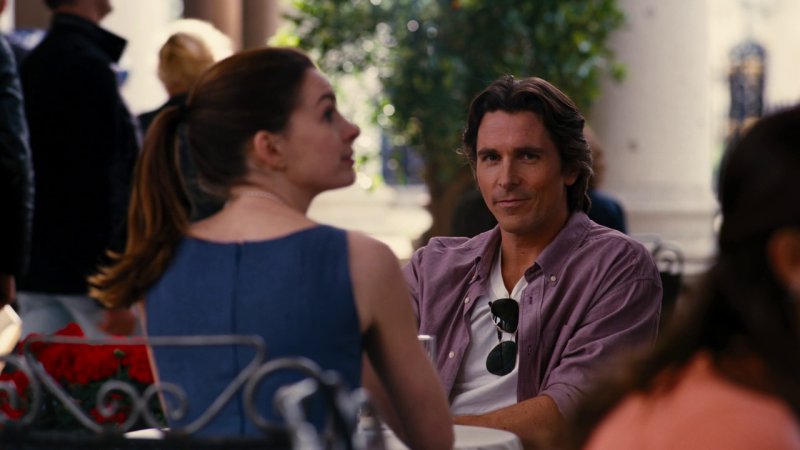This is a spoiler-free discussion, although some general plot points might be touched on. Can’t say the same of whatever comments are below. You’ve been warned.
So, I finally finished series four of Sherlock Holmes last night. As I was sitting in the afterglow, warm and fuzzy, unwilling to watch anything else lest the spell break, I was struck with a realization. The plot of The Final Problem… did not hold up.
The more I thought about it the more I was able to unravel details that bothered me. I’m a nitpicker by nature, so this wasn’t a new feeling, but I wondered why I didn’t notice the problems while I was watching it. Furthermore, why was I trying so desperately to excuse its faults?
I’ve felt like this at least once before, directly after a screening of The Dark Knight Rises. I remember that same feeling of “Wow. Such a good way to wrap up the trilogy,” while sitting in the theater, and then listening to my friends bitch the whole way home about all the stupid details and why they didn’t enjoy it.
I’ve also been that person, most notably during and directly after Avatar, which I hate with the fiery passion of a thousand suns. (Ok, maybe not that much, but it’s pretty bad.) I hate the premise. I hate every detail. I will concede that the visuals were all right (even downright impressive, assuming you had never seen Who Framed Roger Rabbit and/or any of the Pixar cannon.) But in general I can’t forgive that movie.
So what gives? Why am I so harsh on Avatar when The Dark Knight Rises has third act that basically revolves around this plot point:

Well, it basically boils down to three things:
- Context
- Audience Goodwill
- Emotional Resonance
Context
It is entirely possible to hide a bad movie plot through fast pacing and clever editing. For example, Memento has one of those plots that wouldn’t make very much sense (or be particularly interesting) if the story was played in chronological order. Cutting it up keeps the audience on the edge of their seat and obscures some of the more head-scratching details.
Genre also matters. You can maintain an audience’s suspension of disbelief based on what their expectations are. Star Wars can play fast and loose with physics because it’s essential a space adventure series but everyone lost their minds when the crew in Prometheus removed their helmets on the planet. (I know, I was one of them.) The Alien franchise is a survival-horror series so we’re much more critical of any “stupid” action our heroes take. Also, it tends to have a stricter adherence to the “science” part of science-fiction and generally takes itself more seriously.

When it comes to Avatar, the visuals were the big draw. The people who loved it usually didn’t care about the plot. They wanted the immersive experience of a 3D film and a rich fantasy world. Personally, if I’m going to be blown away by visuals I’d like a simple, compact story with little room for convoluted plot contrivances. (See: Mad Max: Fury Road.)
Context is entirely subjective. What some may forgive others have a hard time getting behind. Likewise, what some consider groundbreaking innovation others may see as a cheap gimmick. So let’s move on to…
Audience Goodwill
Both The Dark Knight Rises and The Final Problem are the last installments of a franchise. In respect to context, we want them to be good because we want to say that it goes out on a good note. At this point in both respective series they’ve build up enough audience goodwill to withstand some criticism.
And sometimes a movie is just so bad it can’t be saved. (Looking at you, Spiderman 3.) Context matters in this case, too. The first two Spiderman movies were fairly successful and received decent reviews. But what changed between 2 and 3? Batman Begins came out and suddenly the cultural landscape of comic book movies changed. Audiences loved the dark and gritty realism of Nolan’s take on the character and suddenly they were less forgiving of the Raimi series and its camp. The pendulum swung back the other way in the middle of the Amazing Spiderman series, with #2 losing out to Guardians of the Galaxy, which reminded everyone that camp can be fun.

This doesn’t just apply to serialized properties. Both Wonder Woman and Captain America: The First Avenger had weak third acts but their movies held up without having to rely on previous installments. The first two-thirds of the film buoyed them when their endings started to tank. The reason they had so much goodwill comes down to the time spent on character development. And that leads us to…
Emotional Resonance
When you have good characters the audience wants them to succeed.
I care about Nolan’s Batman. I care about Sherlock and Watson. I care about Wonder Woman and Captain America. So when they come out on top, I’m happy about that, even if the way they got there might’ve been a touch stupid.
I’m going to backtrack and talk about Spiderman 3 again as a comparison. I think one of the reasons that movie lost so much goodwill is because the character of Peter Parker is such a tool. (At least in that film.) In the first two we empathize with his struggles, his internal conflicts and related to him as a flawed hero. By the end of the third movie we don’t care if he succeeds because he’s become so unlikable as a protagonist.

Contrary to that, when Batman finally passes the torch at the end of The Dark Knight Rises, I felt a swell of emotion. During the montage of Sherlock and John solving cases together at the end of in The Final Problem I felt satisfied with how they wrapped everything up. For once the details were just details, and I was able to let it go because of the way it resonated with me emotionally.
It’s a lot easier to forgive something that makes you happy, even if that happiness is entirely subjective.
Additional thoughts
When I originally wrote this, I put a disclaimer saying that this discussion doesn’t apply to intentionally self-aware camp, so-bad-it’s-good schlock, or guilty pleasure movies. I want to retract that statement.
When it comes to bad movies we love, it still applies. Either the context is there (Adam West’s Batman knows exactly what it is) or the audience goodwill is (The Room might be the worst film ever made but I’m enjoying myself so I forgive it) or the emotional resonance is (I won’t try to convince anyone else to watch Last Man on Earth but I also can’t look away. When it’s good it’s really good.)
So what about you, gentle reader? What gets a pass in your book? What can never be forgiven? Let me know in the comments and feel free to tell me how my interpretations of your beloved films are horribly, horribly wrong, while my favorites totally suck.
See you there. 😉

Interesting article, Liz. Like you, I nitpick certain things and give others a pass. Until your article, I never really thought about why, but how you categorize the reasons certainly makes sense.
LikeLiked by 1 person
I am a different type of movie watcher in that I seldom watch an adventure film. Of the ones you’ve mentioned I believe I’ve only seen Star Wars and of those I only saw the first three shown which, as I understand it, are not the first three.
However, I fully agree with your thesis. For the sake of time and space, I shall compare only two films that are more in my viewing line – films made from classic literature. The Three Musketeers and The Count of Monte Crisco both, interestingly enough, written by Alexandre Dumas.
The version of Monte Cristo with the lead acted by Gerard Depardieu angered me beyond belief. Of course, the story was cut, it had to be, but the story was drastically changed. The screenwriter(s) dared to believe they were greater writers than Dumas who must have been turning in his grave when they took what should have been a bittersweet/learned a lesson/quasi-sad ending into one of joy where the Cristo and the love of his life (who is supposed to be going to live in a nunnery!) are splashing away in the waves at a beautiful beach. WTF!!! My goodwill was totally lost! I haven’t seen that movie in 10 years and I’m still made as f—ing hell!
But take The Three Musketeers, the version with Oliver Reed (one of the sexiest men ever despite the fact that he was a drunkard) (1973). The liberties taken with that script was also unbelievable but no one, including me, cared. Why? Because the context totally made a difference. MC was a dramatic tale. 3 Musketeers had dramatic moments, but, the director let those happen only when necessary, and then the story went back to the fun romp with movement (especially from Rachel Welch) from beginning to end. It didn’t have the intense drama of MC, so we didn’t mind that the script was changed. It made us feel happy, so it still had our emotions. It was extremely fast paced, so if the changes were bad, no one noticed, least of all I. Besides, I was watching Oliver Reed. Gowza.
Context, emotional resonance, and audience goodwill are everything. It matters not what type of movie. I’ve used examples of classic tales where the script writers dramatically changed the original stories, but I believe you could apply your theory to any film. Good job!
LikeLiked by 1 person
Great points, all. If you’re into books vs. their film versions check out the series “Lost in Adaptation” on YouTube. He’s done some excellent episodes, with “The Shining” movie being the best example I can think of where an unfaithful adaptation works.
As for the two you mentioned, I regret to say I haven’t seen either. I did have a similar “Holy mother, why?????” reaction in regards to the 2002 version of Count of Monte Cristo for similar reasons (they decided that his sweetheart’s son by another man was actually *his* son, when in the book his sweetheart didn’t marry until YEARS after he disappeared and was convinced he died.) I also have fond memories of the 1993 version of The Three Musketeers because it’s clearly meant as an action-adventure film for children. And it’s Tim Curry as Cardinal Richelieu. I will always love Tim Curry. But that’s definitely a guilty pleasure/so bad it’s good type of movie.
LikeLiked by 1 person
why, oh why, do they keep (can I say fucking on your blog?) fucking with the Count of Monte Cristo? It is a powerful novel and deserves to be made into a small mini-series. The Valentine/Morrell’s son’s subplot is usually cut out, and it is when the MC learns he may have destroyed Morell’s son’s chance at love that he stops at his revenge path and is, in a sense, converted to “good.” It is an essential part of the story, but it isn’t “exciting”, so it is cut. I would love to see this novel fully explored on film.
I will check out the “Lost in Adaptation” series. I agree about “The Shining” – the film was so much better than the novel. Few are. Two more are “The Graduate” and “Forest Gump.”
Speaking of “Lost”, check out the 4 part mini-series “Lost in Austen” – “Pride and Prejudice” purists most likely screamed about it, but it is an adorable and different take on the novel. It will make you laugh laugh laugh, and that, in my mind, was the context of work though perhaps the author meant readers to chuckle more than guffaw.
LikeLiked by 1 person
Right? Netflix better get on that. They did an excellent adaptation of “Jonathan Strange and Mister Norrell” and I prefer that one to the book as well.
LikeLike
The example of _Memento_ has me thinking. The main character in that story has to make decisions without knowing anything that happened more than five minutes ago. Telling his story in five minute blocks in reverse order gives the reader the experience of wondering what he should do next without the context of what has gone before. Then we are confronted with a new chunk of past and realize how wrong we could have been.
That experience is what made the movie for me, and I’ll forgive it any number of sins in return for that favor. I’m not sure if that is the same thing you refer to as “emotional resonance” versus a fourth leg to your stool, but I suspect that having some payoff is an essential part of the bargain and that there are a large number of payoff types possible.
LikeLiked by 1 person
I mean, some of it’s novelty, some of it’s skill in knowing how to write it so that you don’t give away too much while it still makes sense on the rewatch. Some of it’s skill in direction and acting. I really love the scene early in the movie where Carrie Anne Moss looks at him with what you think is pity (because it finally dawns on her that he really, truly doesn’t remember her) but you could also read it as regret for manipulating him.
I really love that movie myself, but you can definitely nitpick the rules of the memory loss and the practicality of a lot of the details if you wanted to go there. But I think most people understand that nitpicking the plot details isn’t the point – the point is in how the story is told.
LikeLike
I been watching The Walking Dead, and while there are a few coincidences that end up saving the characters, the characters are so well-developed and I want them to survive so much, I almost don’t care. So, yeah, I think emotional resonance is a huge one for me.
LikeLiked by 1 person